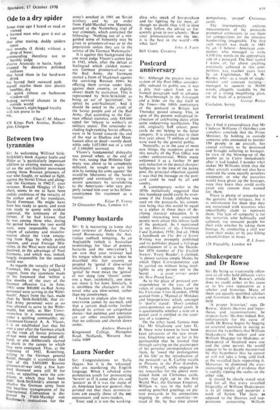Between two tyrannies
Sir: In welcoming Wilfried Strik- Strikfeldt's book Against Stalin and Hitler as 'a particularly important addition to existing memoir mater- ial on the anti-Stalinist movement among those Russian prisoners of war who fought, or wished to fight, against the Soviet Union and along- side the Germans in 1942-5'. your reviewer, Ronald Hingley (3 Oct- ober), seems to me to have been unduly credulous of the veracity of the author and of his translator, David Footman. He might have been less ready to quote, and even less ready to quote with evident approval, the testimony of the former, if he had known that he was among those who, during the period between the two world wars, were responsible for the stream of calumny and misinfor- mation about the USSR emana- ting from Riga by which public opinion, and even Foreign Min- istries, in the West were misled and deceived, to the advantage of Nazi Germany, and which was, indeed, largely responsible for the second world war.
As regards the veracity of David Footman, this may be judged, I suggest, from the statement made in his foreword that 'within a few months of the start of the German offensive (i.e. in June. 1941) some 800,000 ex-Red Army personnel were serving in the Wehr- macht'. Apart from the fact, made clear by Strik-Strikfeldt, that ex- Red Army personnel were at no time allowed to serve in the Wehr- macht, but only, as Slav Unter- menschen in a mercenary army, under a quisling commander, ex- Lieutenant-General A. A. Vlasov, It is an established fact that for over a year after the German attack on the USSR all Soviet prisoners- of-war were either murdered off- hand. or else deliberately starved to death in the camps to which they were consigned. Thus, at the beginning of 1942, Rosenberg. venting to the German general Keitel, thought it scandalous that out of the 3,600,000 Russian prisoners-of-war' only a few hun- dred thousand were still fit for Work, so appalling were the con- ditions in which they had been kept' Strik-Strikfeldt's attempt to absolve the German army from this heartless transgression of the International Convention is dis- proved by Field-Marshal von Retchenau's instructions for the
army's conduct in 1941 on Soviet territory and by an order from Field-Marshal von Manstein, quoted at the Nuremberg trial of war criminals, which contained the following: 'Nothing out of a mis- guided sense of humanity may be given to prisoners-of-war or to the population unless they are in the service of the German Wehrmacht'
It is against this background that one must judge Vlasov's action late in 1942, when, after the defeat at Stalingrad which yielded numer- ous German prisoners-of-war to the Red Army, the Germans started a form of blackmail against the surviving Russian POWs by offering them service under him. against their country, or slightly slower death by starvation. This is represented by Strik-Strikfeldt as being an act of 'patriotism', 'in- spired by anti-Stalinism'. And it should be noted to the credit of the Soviet people and of the Red Army, that according to the Ger- man official statistics, only 818,000 opted for 'release to worker's or military status'. The remainder in- cluding high-ranking Soviet officers. were to be found towards the end of the war at Dachau and Maut- hausen alive or dead—mostly dead, while only 1,053,000 out of a total of 5.160.000 survived.
Vlasov's fundamental disloyalty was proved when, at the end of the war, seeing that Hitlerite Ger- many was about to be completely defeated, he sought to save his skin by turning his arms against 'the would-be liberators of the Soviet people' and eventually trying to secure sanctuary by surrendering to the Americans—who very pro- perly turned him over to his fellow- countrymen for treatment as a traitor.
Edgar P. Young 24 Gloucester Place, London wl






































 Previous page
Previous page